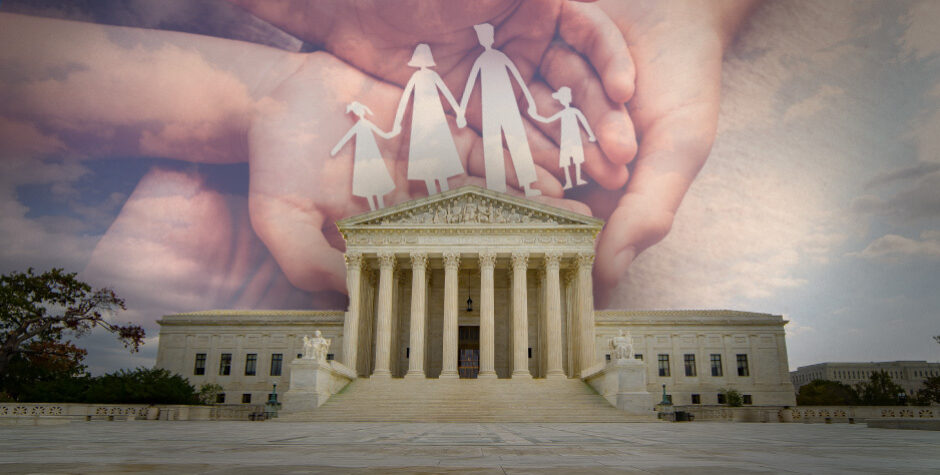Defending Parental Rights and Unborn Lives at the Supreme Court
Does a minor – a girl aged seventeen or younger, who is not emancipated – have an absolute right to obtain an abortion without notifying her parents, and without having a court review her situation? And to put it more bluntly, are Planned Parenthood and other abortionists free to pressure this impressionable young girl into having an abortion without parental involvement?
This question is raised in a lawsuit brought by Planned Parenthood that presents a serious threat to parental rights, the health and safety of young girls, and unborn babies. The ACLJ has filed an amicus brief with the Supreme Court, on behalf of about a quarter of a million ACLJ supporters, to combat Planned Parenthood’s extreme position that teenagers, and even pre-teens, have a “right” to obtain an abortion in secret, without their parents being notified.
Few areas of law are more controversial, and more fractured, than cases dealing with abortion. Supreme Court cases involving abortion are often decided by 5-4 votes, with one or more blistering dissenting opinions disagreeing with whatever the majority’s decision is.
One rare point of agreement among Justices of the Court is that states have broad authority to require that the parents of children under the age of eighteen be notified (except in rare circumstances such as parental abuse) before an abortion can be provided. For instance, in one unanimous opinion, the Court stated that “States unquestionably have the right to require parental involvement when a minor considers terminating her pregnancy, because of their ‘strong and legitimate interest in the welfare of [their] young citizens, whose immaturity, inexperience, and lack of judgment may sometimes impair their ability to exercise their rights wisely.’”
In other words, even the Court’s most ardent proponents of abortion rights have acknowledged that both law and common sense dictate that parental involvement in important decisions in their children’s lives, such as what the next steps should be when a teen pregnancy occurs, should be respected and encouraged. Similarly, public opinion polls have consistently shown widespread support for parental involvement laws; even a substantial percentage of individuals who describe themselves as “pro-choice” believe that the parents of teenagers should be involved in decision-making concerning pregnancy and abortion.
In Planned Parenthood’s warped view, however, nothing short of abortion on demand for teenagers (and even pre-teens), at taxpayers’ expense, without requiring parental notice or involvement, will suffice. A court of appeals panel sided with Planned Parenthood by a 2 to 1 vote, and the State of Indiana has asked the Supreme Court to take the case.
Our brief supports Indiana’s petition and notes that unlike abortion rights, which did not even exist forty years ago, “[t]he recognition and protection of parental rights is a staple of Anglo-American law that predates the existence of the United States Constitution, as well as the United States itself.” Additionally, while our legal system permits judges to regularly decide what is in a minor child’s best interests in a variety of circumstances, Planned Parenthood’s extreme position is that, when it comes to abortion, a minor should be able to disregard the decision of a judge that notifying her parents would be in her best interests.
Further, as explained in our brief, Planned Parenthood’s “let’s pretend that kids are actually adults” position puts children in danger by isolating them from their parents. We pointed out that the FBI “has emphasized that conversations and information-sharing between minors and their parents is a key component in preventing, reporting, and stopping the sexual exploitation of minors” since “[t]he shame, fear, and confusion children feel” when they are being exploited “often prevents them from asking for help or reporting the abuse.”
Our brief also discusses a study of over one hundred survivors of sex trafficking in the United States that further supports increasing the involvement of judges and parents in abortion decisions of unemancipated minors. Many trafficking victims, including minors, are coerced into having multiple abortions, and abortion providers intentionally decline to inquire into the circumstances of trafficking victims’ repeated pregnancies and repeated forced abortions. The study found that 29.6% of the survivors had visited Planned Parenthood clinics.
One survivor explained:
“I got pregnant six times and had six abortions during this time. Several of them were from a doctor who was a client. . . . I came in the back door after hours and paid him off the books. This kept my name off any records. . . . At least one of my abortions was from Planned Parenthood because they didn’t ask any questions. But they were expensive. . . .”
Our brief explained that “abortion providers are not legally obligated to conduct a best interests analysis before providing a minor with an abortion, nor do they do so in practice, and that clearly contributes to the commission and concealment of crimes against minors.” In other words, while parents and law enforcement authorities have legal and moral obligations to protect the overall well-being and safety of minors, abortion clinics do not; they often intentionally turn a blind eye to whatever circumstances led to a teenage, or pre-teen, girl showing up at their door.
We know Planned Parenthood, which is a multibillion-dollar abortion business, has a significant profit incentive for providing these young girls facing tough situations with only one option – the option that lines the pockets of the abortionists. As the survivor cited above said, “They were expensive.” Parents, not abortionists, should be the ones counseling minors about pregnancy decisions.
We are hopeful that the Supreme Court will take this case and uphold the fundamental right of parents to be involved with critically important decisions in their children’s lives, and thereby protect the interests of these young girls and their unborn babies.
